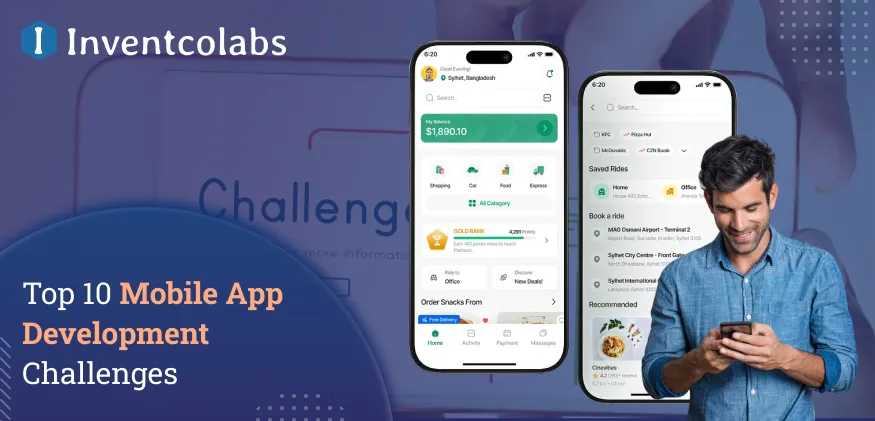Creating a mobile app for businesses is now a mandatory requirement in 2026. The app itself can help a business with a number of problems, but making one is a whole different process.
Amazing things can happen when you take an idea and make it happen. It’s like making your thoughts into a fully working reality.
But the road isn’t that easy. There are challenges at every step of the mobile app development process, from learning about the market to finding the right partner.
Let’s look at the top challenges in building a mobile app platform that you might face in this post. More importantly, we will concentrate on meeting and overcoming these challenges.
If you plan to enter the digital realm with an app of your own, this is definitely a must-read for you.
So without further ado, let’s begin and uncover how to turn roadblocks into milestones!
Why Mobile Apps are Important for Businesses?
Think of mobile apps as your brand’s 24/7 digital handshake, always ready to connect.
They’re not just tools; they’re strong platforms that let you connect customers directly on their smartphones, boost brand visibility, and improve loyalty.
If you have the right app, you can simplify internal processes, improve user experience, and create regular revenue through in-app purchase, subscriptions, or service bookings.
People use their phones more than any other gadget these days. If your company does not have an app, you are essentially allowing your competitors to take advantage of your business.
However, the development of an app presents a distinct set of often complicated challenges, even though it may address a lot of business problems. Next, let’s examine them.
Top 10 Mobile App Development Challenges and Their Solution
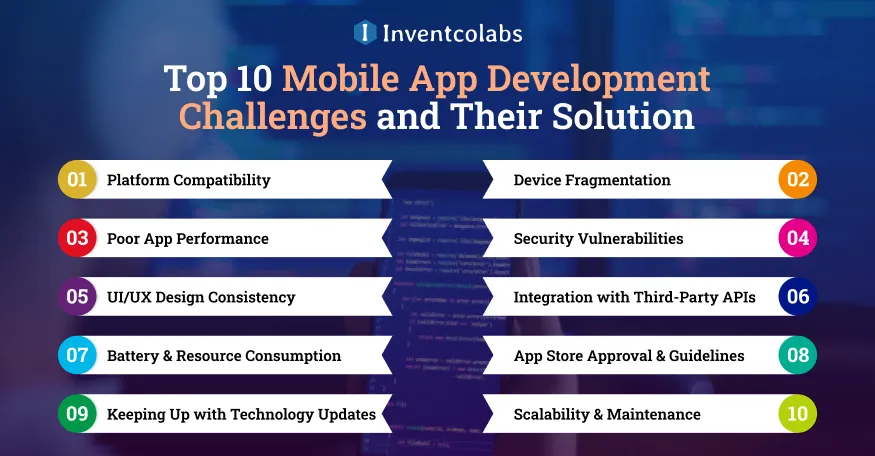
Creating a mobile app involves going through several steps. Naturally, along with your app development process, you face some challenges that may cause delays in your process and cause you to lose time, resources, and budget.
If you’re ready to turn your dream app into reality or you are planning to launch your app for your business.
It’s essential to be aware of the common challenges that can come up in the mobile app development process.
If you know these app development challenges in advance will definitely helps you to prepare and one step advanced in your project toward success.
1. Platform Compatibility
Platform compatibility is one of the biggest and common mobile app development challenges which ensure your app work smoothly across multiple platform like android, iOS, and web.
Every platform has its own checklist, needs, user standards, and running systems.
Without proper support your business mobile app may not properly work, which causes crashes in the app and causes poor user experience, which can cause yu to loss of users and bad reviews for your business app.
Solution:
You can choose cross-platform development with the help of tools like React Native and Flutter to create a mobile app that works well on both platforms whether it is iOS or Android.
If you detect problems early it helps you to do extensive testing on several devices and operating system versions.
Tailor the user experience somewhat for each platform to satisfy user expectations while maintaining core functionalities.
2. Device Fragmentation
One of the most common challenges in mobile app development is device fragmentation, which means your app must work perfectly across multiple devices with different screen size, hardware specifications, and resolutions.
This can cause UI problems, broken layouts, or performance issues, annoying users and risking app withdrawal.
Managing this variety is a common and tricky app development challenge, especially on Android’s vast environment.
Solution:
Use adaptable design methods and flexible UI components that change smoothly to different screens.
Pair this with thorough testing on both real devices and emulators, covering a wide range of types.
This ensures consistent performance and a clean look across all devices, boosting user retention and satisfaction.
3. Poor App Performance
Here is the next challenge which is commonly seen in the mobile app development process which is poor app performance. Which is one of the major issue that can ruin the user experience.
Slow start time, laggy interface, and frequent crashes will cause irritation in users and caue to uninstall the app.
Reason behind this might be poor coding, memory leaks, big media files, and excessive idle jobs. If your app doesn’t work smoothly it definitely causes user experience. Even the best ideas survive the harsh judgement of impatient users.
Solution:
Optimize your app by writing clean, efficient code and reducing media files. Use performance monitoring tools to catch and fix problems early. Reduce server delay and limit needless idle processes.
Regularly test your app on various devices to ensure smooth and fast operation. This dedication to performance keeps users happy and involved, improving engagement and app reviews.
4. Security Vulnerabilities
One of the most concerning challenges in app development is Security Vulnerabilities which offer a serious risk to your mobile app, exposing the sensitive user data to leaks, illegal access, and hacks.
With hacking becoming more complex, protecting your app against risk is one of the main and biggest mobile app development challenges.
A common breach in your mobile app can ruin your brand image and lead to legal action.
Solution:
Make sure to implement strong encryption protocols to safeguard data at rest and in transit. Use safe APIs with proper identification and Authorization checks. Multi factor verification adds an extra layer of safety
Regularly update security fixes and perform risk checks. Educate your team on best security practices to ensure your app stays strong against changing online risks, keeping your users and business safe.
5. UI/UX Design Consistency
UI/UX design consistency is one of the most important things in your app, clashing or confusing UI/UX can cause user experience and retention.
When you create your mobile app design ugly, difficult to manage, or busy it easily makes users annoyed and causes uninstallation of your app.
Maintaining design unity across all screens and devices is one of the biggest app development challenges. Poor user experience lowers the interest, reduces user retention, and hurts your brand value.
Solution:
Invest in clean, natural design focusing on simplicity and ease of use. Develop uniform navigation patterns and style guides to unify the look and feel.
To solve this app challenge you need to conduct a feedback test by which you find the pain points and continuously update your app as per the users convenience.
Prioritize accessibility and responsiveness of your app which ensures a smooth experience on multiple devices and platforms which keeps users happy and loyal toward your app.
6. Integration with Third-Party APIs
Your users need facilities, and for that, you need to connect third-party APIs like payment platforms, maps, and analytics, which boost your app’s usefulness.
But this comes with its own app development challenges, API rate limit, unexpected downtime, and poorly defined addresses, which can stall development and cause annoying bugs.
Relying heavily on external service also presents risks beyond your control, which can impact app security and user experience.
Solution:
Choose stable, well-documented APIs with strong community support. Implement backup methods to handle downtime easily and watch API usage to avoid hitting limits.
Test fully across different situations and keep your links open for easy changes or replacements. Clear contact with API providers helps you stay ahead of changes, ensuring smooth, ongoing service within your app.
7. Battery & Resource Consumption
Mobile apps that aggressively drain battery or capture excessive memory quickly lose users. High resource usage leads to device burning, bad performance, and an unsatisfied user base.
Managing efficient battery and memory usage remains one of the main app development challenges, especially for feature-rich apps running multiple background processes that eat into device resources without users even realizing it.
Managing efficient battery and memory usage remains a major app development challenge, especially for feature-rich apps running multiple background processes that eat into device resources without users even realizing.
Solution:
Optimize your app by reducing background chores and useless services. Use efficient coding practices to lower CPU and memory usage. Regularly test power consumption on real devices to find leaks.
Implement flexible features that change resource use based on device state. This careful resource management keeps your app user-friendly, increasing battery life and improving overall experience.
8. App Store Approval & Guidelines
One of the most common challenges in mobile app development is getting approval from the App Store.
Both the platforms whether it is Apple App Store or Google Play Store have strict guidelines around content, data usage, and most importantly privacy.
If you don’t follow the guide line of the platform it causes you removal of apps or rejection to upload on the app store, which causes you loss of resources and time.
Guiding these complicated and often changing policies takes attention to detail and a deep knowledge of app store standards.
Solution:
Stay updated with the latest app store policies and guidelines. Thoroughly review your app for compliance before submission.
Engage in pre-launch testing focused on policy obedience. Work with skilled writers or experts familiar with app store nuances.
Preparing detailed paperwork and clear privacy policies improves chances of approval, speeding your app’s time to market and reducing costly delays.
9. Keeping Up with Technology Updates
The fast-paced world of mobile technology means new OS versions, devices, and development tools constantly emerge. These updates can suddenly break app features, causing crashes or conflicts.
Staying current is a tough but important app development challenge, especially when users change devices or software at different rates, causing developers to juggle multiple settings simultaneously.
Solution:
Maintain a cautious approach by monitoring OS and device updates closely. Schedule regular app upkeep and testing to spot and fix problems early. Use modular code and customizable architectures to ease updates.
Collaborate with your development team to stay informed about new technologies, ensuring your app remains suitable, safe, and runs perfectly across all platforms.
10. Scalability & Maintenance
Building an app that can easily grow alongside your business is a crucial mobile app development challenge. Without scaling, your app may struggle under increasing user loads, leading to slowdowns or crashes.
Additionally, ongoing maintenance, including bug fixes and performance improvements, is important but often underrated, risking long-term app health and user happiness.
Solution:
Design your app with an open, modular design that allows easy growth. Plan and budget for frequent updates, thorough testing, and prompt bug fixes.
Use cloud-based technology to handle changing user loads. Prioritize maintainability in your codebase to reduce technical debt, ensuring your app grows smoothly as your business expands.
Key iOS App Development Challenges
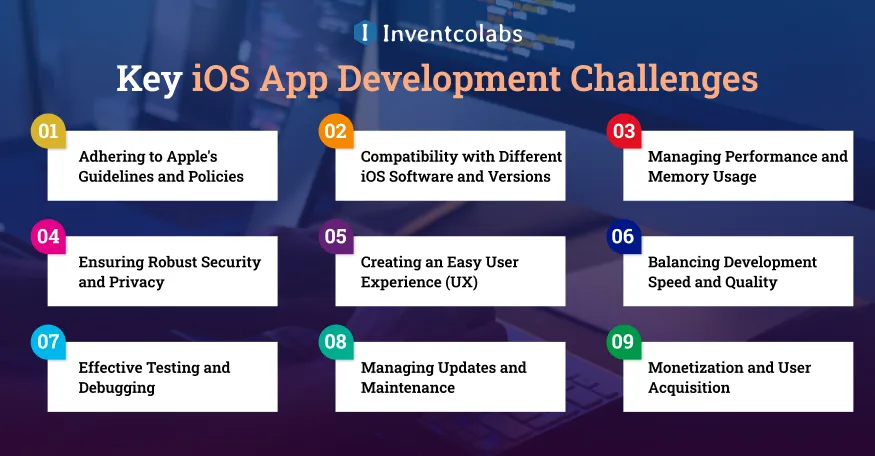
When it comes to iOS App Development Challenges, Apple sets a high bar. Here are the hurdles:
- Adhering to Apple’s Guidelines and Policies: Rejections can be brutal; follow their HIG (Human Interface Guidelines) closely.
- Compatibility with Different iOS Software and Versions: Test on different versions to avoid losing your user group.
- Managing Performance and Memory Usage: iOS users expect buttery-smooth experiences.
- Ensuring Robust Security and Privacy: Apple is strict on data keeping. Use safe files, rights, and encryption.
- Creating an Easy User Experience (UX): Intuitive design = happy people.
- Handling Network and Connectivity Issues: Offline help and proper warning messages matter.
- Balancing Development Speed and Quality: Use SwiftUI and frameworks, but don’t rush QA.
- Effective Testing and Debugging: Leverage TestFlight and unit testing.
- Managing Updates and Maintenance: Apple frequently updates its OS stay on top of it.
- Monetization and User Acquisition: In-app purchase, ads, or payments need careful planning and strategy.
Specific Android App Development Challenges
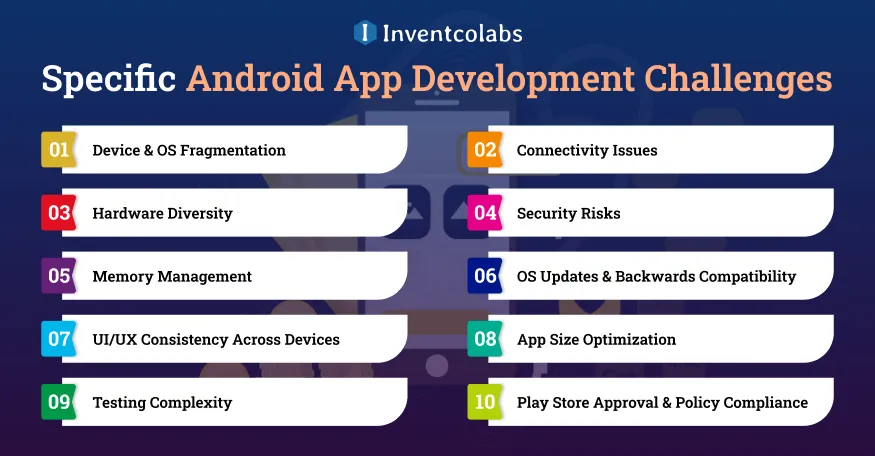
The Android app development challenges bring their own set of problems, many coming from the open environment.
- Device & OS Fragmentation: Hundreds of devices and OS versions to account for.
- Connectivity Issues: Not all users have strong networks; adjust for idle and low-data usage.
- Hardware Diversity: From cheap phones to high-end models, try across the range.
- Security Risks: More open to malware and hacking; protect user data fiercely.
- Memory Management: Low-end devices need fast code.
- OS Updates & Backwards Compatibility: Your app must handle both the latest and older versions.
- UI/UX Consistency Across Devices: Design adaptively for different screen sizes and resolutions.
- App Size Optimization: Keep the download lightweight. Modularize features if needed.
- Testing Complexity: Use simulations and cloud-based real device testing.
- Play Store Approval & Policy Compliance: Follow all content, privacy, and data regulations to avoid shutdown.
The Next Set of Challenges: Future Trends Shaping App Development
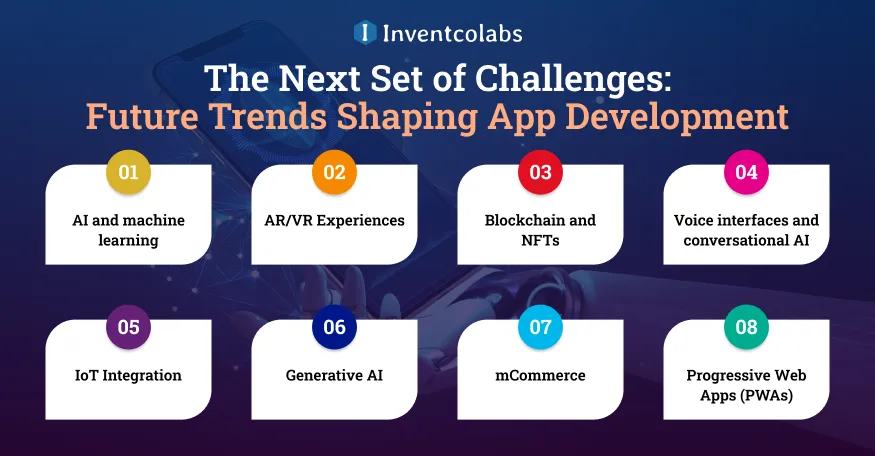
As mobile technology advances, businesses must change to quickly changing user standards. Staying competitive means accepting future-focused solutions that improve both performance and engagement.
Here’s a look at the most influential trends changing the scene, and how top solutions like AI app development services or blockchain app development services can future-proof your product.
1. AI and Machine Learning
Smart robots, predictive analytics, and UX that can be changed are becoming commonplace. If you use AI app development services, your app will be better, more natural, and a lot of fun.
2. AR/VR Experiences
Augmented reality (AR) and virtual reality (VR) experiences can be used to get people more interested in learning, showing off products, and watching interesting material.
3. Blockchain and NFTs
In today’s digital world, security and access are necessities. You can add tamper-proof transactions, decentralized models, and NFT interfaces to blockchain app development services. These are great for games, finance, and souvenirs.
4. Voice Interfaces and Conversational AI
UX that is driven by voice is now the rule. Incorporate smart tools and helpers for next-gen interaction.
5. IoT Integration
Connected groups are the way of the future. IoT app development services help make sure that everything works well on all devices, from smart houses to gadgets.
6. Generative AI
Unlock creative automation with apps that make content, ideas, or code in real time, great for work and design platforms.
7. mCommerce
The mobile shopping wave isn’t slowing down. With mCommerce app development services, make lightning-fast, safe, and personalized shopping experiences.
8. Progressive Web Apps (PWAs)
Deliver app-like features with the speed and ease of the web, no downloads needed.
Let Inventco Take Care of These Challenges for You!
When it comes to overcoming mobile app development challenges, having the right tech partner makes all the difference. At Inventco, we don’t just write code, we guide you through every critical decision. From selecting the right tech stack to defining features that offer the best user experience, our experts are here to make sure your app is built for the future, not just the launch.
As the best mobile app development company, we value transparency, collaboration, and long-term vision. That means explaining every option, trade-off, and growth opportunity, so you’re fully informed and confident in every step. Whether you’re launching a new product or scaling an existing one, Inventco helps you build smart, scale fast, and stay ahead.
Let’s transform your app idea into a powerful, future-ready reality, together.
Wrapping Up
Building a mobile app in today’s competitive digital space is both a necessity and a challenge. From platform compatibility and security concerns to integrating future tech trends, the journey demands strategic planning, technical expertise, and ongoing maintenance.
While challenges are inevitable, they’re also conquerable, with the right mindset, tools, and development approach. Whether you’re a startup or an enterprise, understanding these hurdles helps you make smarter decisions and avoid costly mistakes.
As mobile technology continues to evolve, staying informed and adaptable is key. So start strong, plan wisely, and turn your mobile app vision into a scalable, successful digital solution.
FAQ’s
Q1. What are the biggest challenges in mobile app development?
Ans. Some of the biggest challenges include platform compatibility, security risks, bad UI/UX, third-party interaction issues, and performance problems like power drain or memory hogging. Navigating app store rules and keeping up with tech trends also pose ongoing challenges.
Q2. How can I overcome security issues in app development?
Ans. Use strong encryption, safe APIs, and multi-factor authentication. Regular code checks and compliance with data protection rules (like GDPR) are key. Partnering with skilled developers helps reduce risks.
Q3. Why is UI/UX consistency such a big deal?
Ans. A confused or ugly design turns people away. A well-thought-out UI/UX design ensures smooth travel, boosts engagement, and improves user retention. Always favor simple design and user testing.
Q4. How do I handle API integration challenges?
Ans. Choose trusted third-party APIs with good documentation. Monitor for rate limits, handle failures appropriately, and ensure backup methods. Good planning and skilled devs go a long way here.
Q5. Why is mobile app development difficult?
Ans. Mobile app development isn’t just about writing code, it’s about handling design, performance, platform compatibility, security, scaling, and user standards. Add in ever-evolving tech changes and app store policies, and you’ve got a high-stakes balancing act. That’s why strategy, planning, and skilled execution are everything.
Q6. What is the failure rate of mobile apps?
Ans. Around 80-90% of mobile apps fail to gain popularity. The reasons? Poor UX, lack of market research, weak performance, and skipping proper QA. Building a great app isn’t just about launching, it’s about fixing real user problems regularly and effectively.
Q7. What is the key factor to consider when designing for mobile apps?
Ans. User experience (UX) is king. A mobile app must be simple, responsive, visually pleasing, and easy to explore. Design uniformity, simplicity, and usability across devices can make or break your app’s success.
Q8. Who can help me overcome mobile app development challenges?
Ans. Hiring the best mobile app development company, like Inventco, can be a total game-changer. From strategy and technology advice to design, development, and post-launch support, Inventco helps you handle every problem with confidence. With their knowledge, you avoid costly mistakes and build high-performance, future-ready apps that stand out in the market.
Q9. What is the biggest challenge in mobile app development?
Ans. Platform fragmentation tops the list. With different screen sizes, OS versions, and hardware specs, ensuring compatibility and performance across all devices can be a big task.
Q10. Why do developers prefer Android?
Ans. Android gives more freedom, open-source tools, and a wider global user base. It’s easier to publish apps on Google Play Store, and the platform allows for deeper customization, making it a favorite playground for devs who like creative control.

